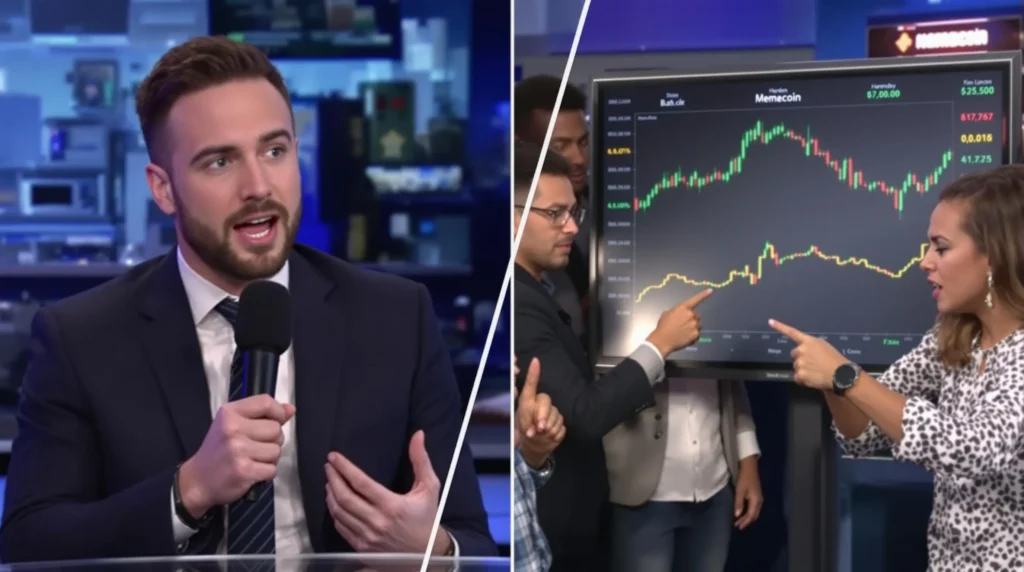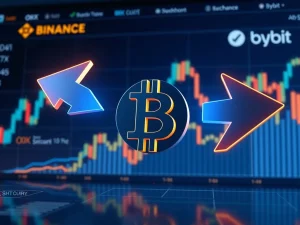Explosive Claims: Libra Founder Exposes Memecoin Critics’ Insider Deal Envy in Shocking Coffeezilla Interview

The cryptocurrency world is ablaze with fresh controversy after Libra token founder, Hayden Davis, made explosive statements regarding memecoin critics. In a no-holds-barred interview with the renowned crypto investigator Coffeezilla, Davis didn’t mince words, suggesting that much of the criticism directed at memecoins stems from sheer envy – critics, he alleges, are simply bitter about missing out on lucrative insider deals.
Are Memecoin Critics Just Sour About Missed Insider Deals?
Davis’s bold claims have ignited a firestorm of debate within the crypto community. He argues that the vocal memecoin critics, often quick to dismiss these digital assets as lacking utility or being inherently risky, are actually masking their disappointment at not being part of the early, profitable stages of these projects. He suggests that the real issue isn’t the inherent nature of memecoins themselves, but rather the critics’ exclusion from what they perceive as exclusive, money-making opportunities.
This assertion directly challenges the narrative often pushed by memecoin critics who emphasize the potential for scams, rug pulls, and financial losses associated with these highly volatile assets. Are these criticisms valid concerns, or is there a layer of resentment fueling the negativity, as Davis suggests?
Hayden Davis Defends Memecoin Practices in Coffeezilla Interview
The interview with Coffeezilla interview is already making waves across social media and crypto forums. Known for his investigative journalism in the crypto space, Coffeezilla’s interviews are often candid and probing, and this one with Libra founder Hayden Davis is no exception. Davis used the platform to defend not just memecoins, but also the practices often associated with their launch and promotion, including what some might consider insider deals.
Here are some key takeaways from Davis’s defense:
- Early Access is Inevitable: Davis argues that in any emerging market, especially in the fast-paced world of crypto, early access and preferential deals are simply part of the landscape. He contends that it’s naive to expect a perfectly level playing field from the outset.
- Critics are Gatekeepers: He further suggests that some memecoin critics position themselves as gatekeepers of the crypto space, attempting to define what is ‘legitimate’ and what is not. This, according to Davis, is often driven by a desire to maintain their own influence and control over the narrative.
- Focus on Community: Davis emphasized the importance of community in the memecoin space. He believes that the value of memecoins often lies in the strength and engagement of their communities, rather than solely on traditional metrics of utility or technology.
- Transparency is Key (But Selective): While advocating for the memecoin space, Davis touched upon transparency but seemed to imply that transparency is important only when it suits the project and its founders. This nuanced stance on transparency is likely to draw further scrutiny.
Understanding the Insider Deal Accusations
The term “insider deals” in the crypto context often refers to pre-sale token allocations, private investment rounds, or early access opportunities that are offered to a select group of individuals – often influencers, venture capitalists, or those connected to the project team. Critics argue that these deals create an uneven playing field, allowing insiders to acquire tokens at significantly lower prices before they are released to the public market, leading to potential pump-and-dump schemes and unfair advantages.
The controversy around insider deals is not new. It’s a recurring theme in the crypto world, raising questions about fairness, transparency, and equal opportunity. While proponents argue that these deals are necessary to bootstrap projects and incentivize early supporters, detractors view them as inherently unfair and potentially manipulative.
Who is Hayden Davis, the Libra Founder?
Libra founder Hayden Davis is a prominent, albeit controversial, figure in the cryptocurrency space. Known for his involvement with the Libra token (not to be confused with Facebook’s Diem, formerly Libra), Davis has been a vocal advocate for decentralized finance and alternative digital assets. His opinions often spark debate, and his latest comments about memecoin critics are no exception.
Davis’s background includes:
- Early Crypto Adopter: He has been involved in the cryptocurrency space since its early days, witnessing the evolution of Bitcoin and the emergence of altcoins.
- Libra Token Project: Davis is best known for founding the Libra token, an attempt to create a stable and accessible digital currency. While the project faced challenges and criticism, it positioned Davis as a key voice in the crypto conversation.
- Vocal Advocate: Davis is known for his outspoken nature and willingness to challenge conventional wisdom within the crypto industry. He frequently engages in discussions on social media and through interviews, often taking contrarian stances.
The Coffeezilla Factor: Why This Interview Matters
Coffeezilla interview platforms are known for their in-depth investigations into scams and controversies within the crypto and online business worlds. Hosted by Stephen Findeisen, known as Coffeezilla, the channel has gained a reputation for uncovering fraudulent schemes and holding individuals accountable. An interview on this platform carries significant weight and attention within the crypto community.
The decision of Libra founder Hayden Davis to engage with Coffeezilla is notable. It suggests a willingness to address criticisms head-on, even in a potentially challenging environment. However, it also opens Davis up to intense scrutiny and further questions about his views and the practices he defends.
The Broader Implications for Memecoins and Crypto Criticism
Davis’s statements force us to consider the motivations behind criticism in the crypto space. Are memecoin critics genuinely concerned about investor protection and market integrity, or is there, as Davis suggests, an element of sour grapes at play? The reality is likely a complex mix of both.
Here are some points to consider:
- Valid Concerns: Many criticisms of memecoins are valid. The space is rife with scams, rug pulls, and projects lacking long-term sustainability. Responsible criticism plays a vital role in protecting investors.
- Market Dynamics: The allure of quick gains and the fear of missing out (FOMO) are powerful drivers in the memecoin market. This can lead to irrational exuberance and create bubbles that eventually burst.
- Community Power: Memecoins often demonstrate the power of community-driven value. While this can be positive, it also makes them susceptible to manipulation and hype-driven volatility.
- Evolving Landscape: The crypto landscape is constantly evolving. What is considered a ‘legitimate’ project or investment today may be viewed differently tomorrow. Open dialogue and critical analysis are crucial for navigating this dynamic space.
Final Thoughts: A Provocative Perspective
Hayden Davis’s claims are undoubtedly provocative and will likely fuel further debate about memecoins, insider deals, and the nature of criticism in the crypto world. Whether you agree with his perspective or not, his comments serve as a crucial reminder to critically examine the motivations behind both the promotion and the condemnation of different crypto projects. The Coffeezilla interview has thrown a spotlight on a complex issue, and the conversation is far from over. One thing is certain: the world of memecoins and crypto criticism is anything but boring.









